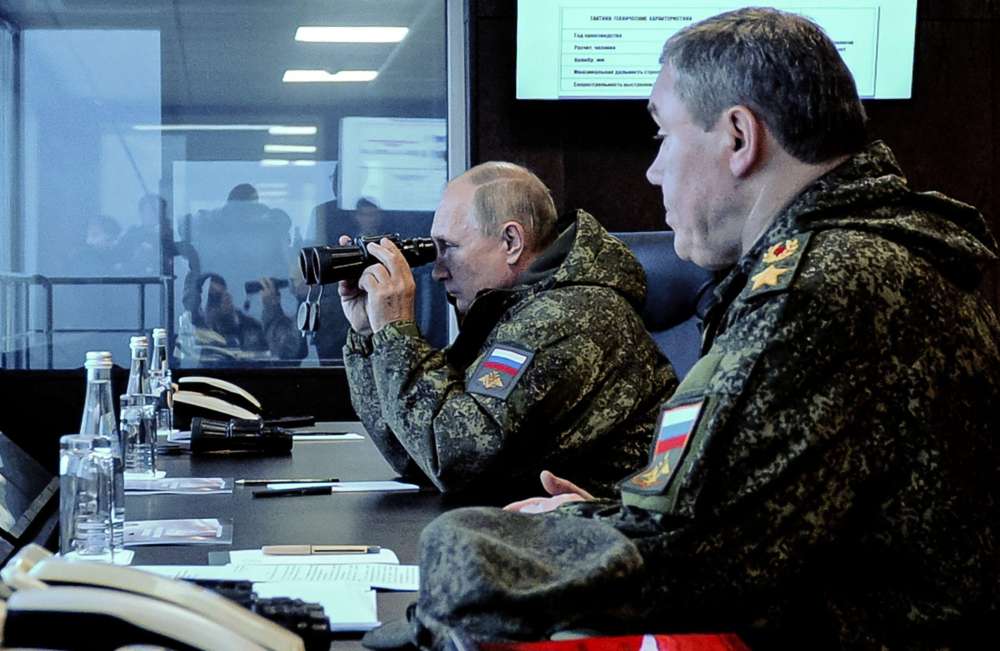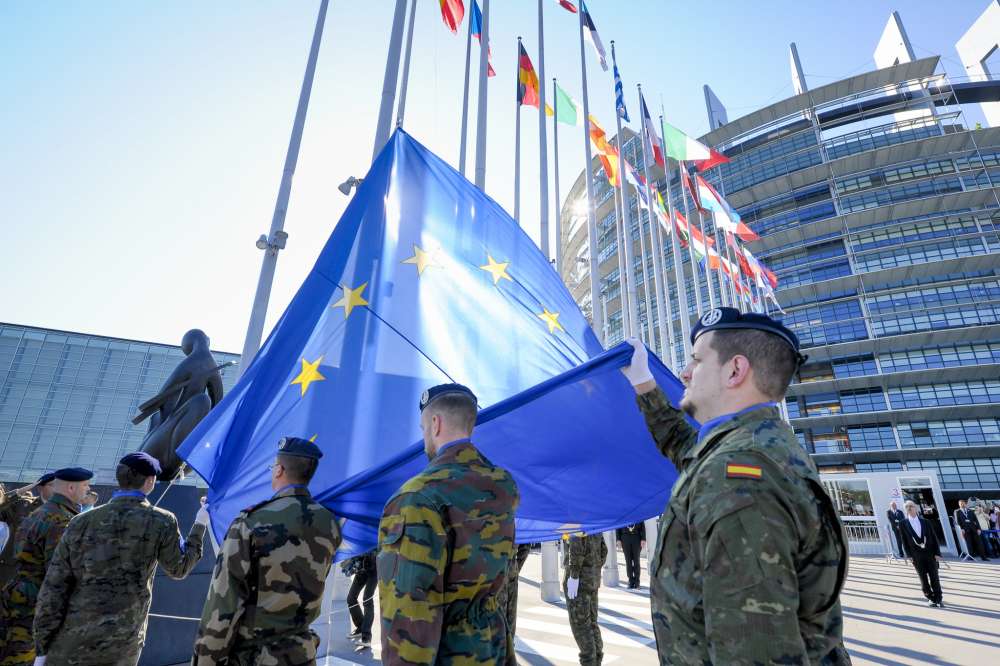Make Germany Secure Against Russia

(Mikhael Klimentyev /Shutterstock)
After thirty years of historical reconciliation and special relations, this is an uncomfortable truth – but the primary aim of Germany’s security strategy should be to contain Russia in Europe.
It is a telling coincidence that the development of Germany’s first National Security Strategy falls together with the tragedy of war in Europe and the biggest security crisis on the European continent after the Balkan wars. For the first time, Germany is faced with an external security threat, even if most Germans still do not feel immediately threatened by Russia – and it truly needs a national security strategy that deserves the name. Across the Pond, in the United States, the regular drafting of such strategies is required by law and “essentially a formal, legally mandated exercise in grand strategy.” Grand Strategy It is a process with the aim to impose cohesion and to identify “objectives that must be achieved to produce security” as well as “the political and military actions that are believed to lead to this goal.” Grand Strategy 2
For Germany, this is a new experience. For decades, the country has been a consumer of security, not a producer. Berlin was comfortable and complacent under the US protective umbrella, which allowed it to develop a special relationship with Russia that now comes back to haunt Germany. The country eternally criticized for a lack of strategic culture and clearly defined national interests is suddenly forced to find an answer to the basic question of grand strategy (an area of statecraft and study which barely exists in Germany): What is Germany’s plan for making itself secure? Grand Strategy 3 And at the core of this question: What is our plan for making ourselves secure against Russia? At the very moment, this is the first-order question that Germany’s foreign and security policymakers have to answer. It is of higher priority than the question what future relations with Russia will look like (as suggested by the chancellor’s foreign policy advisor) or whether a return to normal relations with Moscow will be possible at any point in the distant future. The latter is an intellectual exercise – the former a strategic necessity.
» What is our plan for making ourselves secure against Russia? This is the first-order question that Germany’s foreign and security policymakers have to answer. «
Recognize Russia’s Threat Beyond Ukraine
There are four immediate considerations on Russia that Germany’s upcoming security strategy should reflect. First, it must acknowledge that Russia poses a long-term security threat to Germany beyond Ukraine. The longer the war continues, the more the myth of a mighty Russian army dissolves. Given Ukraine’s lightning advance in the areas east of Kharkiv and the Russian army’s generally poor performance, it is very tempting to write Russia off as posing merely an indirect threat to Germany’s security, and to forget that Russia’s war is not only about Ukraine, but the expression of Moscow’s aim to upend the entire order in Europe. The latter was laid down by the Kremlin in its draft treaties from December 2021. It is therefore far too early for Berlin and Europe to lower their guard.
There is no evidence yet that Vladimir Putin has realized the strategic blunder of his invasion. Similarly, there is no reason to believe that he would not continue this war by all means, or not go further beyond Ukraine if the opportunity arises and capabilities allow. Despite the uplifting news of Ukraine’s military successes, the jury is still out on the question whether this war’s outcome will – in the long run – deter a future Russia from new aggression or rather tempt its leadership toward new wars. Ukraine may currently contain the threat that Russia poses to Germany, but a threat it remains.
» Germany’s National Security Strategy should regard Ukraine as Germany’s first line of defense against Russia – and it should understand Poland and the Baltic states as part of that defense. «
Second, Germany’s National Security Strategy should regard Ukraine as Germany’s first line of defense against Russia – and it should understand Poland and the Baltic states as part of that first line of defense. This would allow the shifting of military capabilities that are dedicated to national defense and NATO commitments toward these frontline states. Military equipment can be reproduced in Germany while existing capabilities fulfil a more useful function on the Ukrainian battlefields or by strengthening Poland’s and the Baltic’s defenses. By taking away key equipment from the German Bundeswehr, such a shift would have a negative impact on the training of German soldiers; but the greater gains for Germany’s security are to be made in Ukraine at the moment. Moreover, with the support of the United States and European partners, Germany should step up and send battle tanks and infantry fighting vehicles to Ukraine to help it continue its offensive. In practice, this means providing Kyiv with Leopard-type main battle tanks and infantry fighting vehicles (Marder) from the inventories of the Bundeswehr and the German arms industry – a step long overdue.
Key Points:
- The security strategy must acknowledge that Russia poses a long-term security threat to Germany beyond Ukraine.
- Germany should commit to weakening Russia economically and pledge to uphold and step up sanctions against Moscow.
- The strategy should also consider escalation management vis-à-vis Russia – without making this the overriding strategic priority.
Commit to More and Stronger Sanctions
Third, the National Security Strategy should express a commitment by the German government to weakening Russia economically and, to that end, include a pledge to uphold and step up sanctions against Moscow. The first six months of the war have demonstrated that sanctions work best in the medium term. Yes, Western sanctions are relevant for Ukraine and the course of the war, but they are even more relevant for Europe’s security: they diminish Russia’s potential to conduct future wars and to threaten other European states. Economic and budgetary difficulties for Russia will heighten the costs of aggressive behavior. More and stronger sanctions, especially on oil and gas, are therefore as important for Germany’s own security as they are for that of Ukraine.
Finally, the security strategy should also take into account escalation management vis-à-vis Russia – but without making this the overriding strategic priority. Putting the unlikely possibility of nuclear escalation front and center in policymaking will not necessarily discourage Russia and other actors from nuclear saber-rattling. On the contrary, it could have the opposite effect and encourage this kind of brinkmanship if threats of nuclear war are perceived by Russia and others as producing a desired effect on the other side, such as a decision to limit the scope and type of military support to Ukraine or other allies. The question of how to deal with a potential nuclear escalation should not be excluded from the strategy. But it is important to recognize that the collective political, humanitarian and military costs of nuclear use are extremely high – even for Russia.
» Putting the unlikely possibility of nuclear escalation front and center in policymaking will not necessarily discourage Russia from nuclear saber-rattling. On the contrary, it could have the opposite effect. «
Politically, Moscow would risk upending the support of China, which would likely feel threatened by a loose-cannon nuclear Russia. Militarily and from a humanitarian perspective, the risks that a use of nuclear weapons on the battlefield or in Russia’s vicinity poses to Russia’s own soldiers and its population would be unjustifiable — not to speak of the international outcry in face of such a civilizational breach. Such a move could also lead to greater conventional involvement in the war by NATO and thus possibly spell Russia’s full military defeat, the direct opposite of its strategic objectives in this war.
Contain Russia in Europe
Germany’s relationship with Russia will remain adversarial for the foreseeable future. There is little chance to positively influence Russia – the regime or the population – from the outside. The primary aim of Germany’s National Security Strategy should thus be to contain Russia in Europe, and to thereby make Germany secure against Russia. After thirty years of historical reconciliation and special relations with Russia, this is an uncomfortable truth. But as German Chancellor Olaf Scholz argued in his Prague speech: The European Union was born as a peace project to prevent war within, but today it has a “new peace mission” – to protect its members from the outside. The same is true for Germany. And doing so means: safeguarding Germany’s security and stability against Russia.
Liana Fix
Historian, Political Scientist & Expert for Eastern Europe and Russia
Weiterlesen

The Real Zeitenwende: A Europe That Defends Itself
With growing tensions between the US, China and Russia, it is not a smart bet for Europe to rely on Washington to provide security. The good news: it is also no longer necessary.

The Cost of Competitiveness: Why Germany’s Security Requires an Economic Transformation
Even if Germany did become more assertive in military terms, that would not solve a key problem with German foreign policy: the country’s economic dependence on exports.

Better Safe than Sorry: Lessons from Finland
In the process of its security policy rethink, Berlin has the chance to become a capable security ally for the Nordic region. Germany may have a lot of catching up to do, but its northern neighborhood can offer the right peer group with which to join forces.